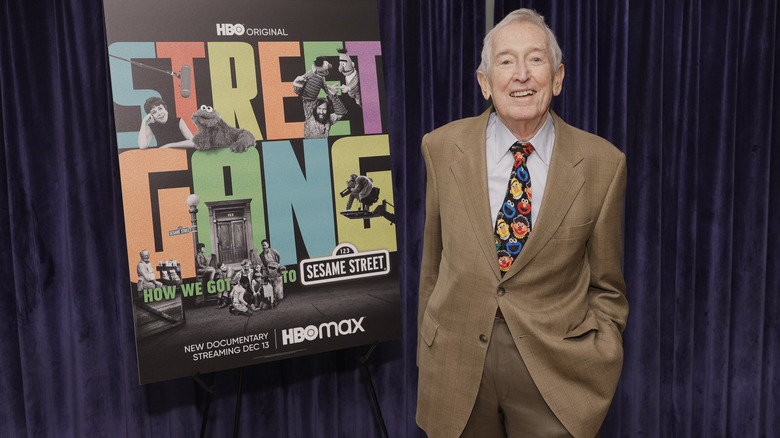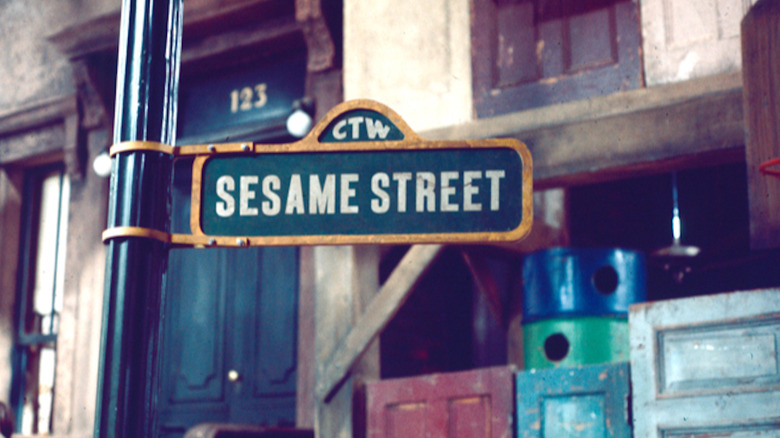Why Sesame Street's Bob McGrath Mattered To Generations Of Kids – And Especially Musicians
A bright, benevolent light went out on December 4, 2022, when Bob McGrath passed away at the age of 90. For 47 years, he maintained a residence as Bob Johnson on "Sesame Street," where, at an amazing 130-episode-per-season clip (until 1998), he taught children the joy of music. Whenever Bob dropped by Gordon and Susan Robinson's apartment, or popped his head into Mr. Hooper's shop, you knew a sing-a-long was imminent. He had a load of songs in his arsenal, and not a bum one in the bunch. But as a loyal viewer in the late 1970s, I always perked up when Bob busted out a rendition of "One of These Things," "A Face" or "The People in Your Neighborhood."
The vast majority of my earliest memories center on movies, television and music. I retain fragments of going to see "Star Wars" in 1977, rocking to and fro in front of my record player to Pete Seeger's "Froggy Went a Courtin'" and belting out "I've Got Two" as encouraged by Bob. These cultural experiences weren't just foundational for me. Though the movies and music will likely vary given your upbringing, I'd wager that most of us paid daily visits to the racially and ethnically inclusive confines of "Sesame Street." With this in mind, there might be few musicians who can claim a more profoundly elemental influence on multiple generations of singers and songwriters than Bob McGrath.
A neighborhood where we all sang differently, but always together
Having grown up in a small, very white Ohio town, my early trips to "Sesame Street" were essential. I got to know the African-American Gordons, the Mexican-American Luis (Emilio Delgado) and Puerto Rican-born Maria (Sonia Manzano), and never once found it odd or, god forbid, objectionable that they possessed a different skin tone than me. I wasn't exposed to hate until I shared classrooms and playgrounds with the children of bigots.
Like most kids, I adored the neighborhood's muppet denizens (who dominate the show today), but in the pre-internet age, when most houses lacked a video game console, the participatory nature of a sing-a-long was exhilarating. I was being asked by the people being beamed into my family's living room to be a part of their performance, and I obliged with relish. In a gesture that the very worst people among us would castigate as "woke" today, songs were occasionally performed in different languages, so that, for instance, Spanish-speaking children could join their English-speaking friends in the musical fun.
For a white kid, it was vital for me to see Bob interacting with his friends in their language (including American Sign Language, which he learned so he could communicate with deaf cast member Linda Bove). And it left an especially deep impression on me that he connected with people through music. Yes, there will always be a selfish dimension to live performance (instant gratification is a helluva drug), but there's nothing quite like the high of eliciting a smile or a seemingly involuntary cheer from another person through your music.
Bob believed in the everlasting power of song
The American folk music revival of the mid-20th century was a testament to the power of song. It is impossible to conceive of the period's workers and Civil Rights protests without masses of people singing in unison, over and over again, to "We Shall Overcome." McGrath harnessed that transformative power as a means to a less confrontational end. When he sang to us from his stoop on "Sesame Street," he did so with a kind heart, offering nothing more complicated or controversial than friendship. He made us feel seen and special. Most importantly, he made us want to sing.
I imagine many of our greatest Gen X musicians were planted in front of their television in the 1970s and as I was, belting out "One of These Things" with joyful abandon. The quality of your voice wasn't a concern. Heck, it didn't matter if you couldn't even carry a tune. We joined in the revelry to experience that stirring sense of belonging to a community that stretched far away from your front door. Bob connected us. So sing a song for your old friend from "Sesame Street" today. Sing it loud.

